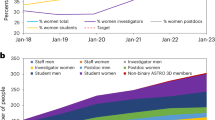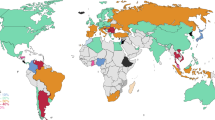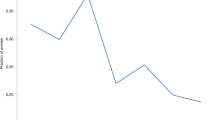Abstract
The under-representation of women in science, technology, engineering and mathematics has been an issue of great concern within the European scientific community and beyond. To initiate actions that will alleviate this deficiency, it is important to understand the reasons behind it. This Perspective highlights the results of our research into the situation of women in the field of astronomy and astrophysics in Spain, which was first published in Spanish in 2010. In that study, we first summarized the situation of women astronomers in Spain on the basis of statistical data obtained from the most relevant Spanish institutions. Then we combined in-depth interviews with teaching staff and researchers that took place at the same time as the statistical survey. We also interviewed groups of PhD candidates and post-doctoral researchers to explore potential trends. Here we update the quantitative aspects of this analysis with more recent data from 2016, and present action plans already in place or recently proposed to improve the situation of women astronomers in Spain. We make this information available to the international astronomical community as motivation for further studies.
This is a preview of subscription content, access via your institution
Access options
Access Nature and 54 other Nature Portfolio journals
Get Nature+, our best-value online-access subscription
$29.99 / 30 days
cancel any time
Subscribe to this journal
Receive 12 digital issues and online access to articles
$119.00 per year
only $9.92 per issue
Buy this article
- Purchase on Springer Link
- Instant access to full article PDF
Prices may be subject to local taxes which are calculated during checkout



reproduced from ref. 16, SEA

Flag images, Vermicule / Alamy Stock Vector

Similar content being viewed by others
References
Barcons, X. & Rodrigo, R. El espectacular auge de la astronomía en España. Árbor CLXXXIII, 705–719 (2007).
Weneras, C. & Wold, A. Nepotism and sexism in peer review. Nature 387, 341–343 (1997).
Hilton, D. Practical policies can combat gender inequality. Nature 523, 7 (2015). 2 July.
National Research Council. Gender Differences at Critical Transitions in the Careers of Science, Engineering, and Mathematics Faculty (National Academies Press, 2010).
Science Policies in the European Union: Promoting Excellence through Mainstreaming Gender Equality (European Commission, Brussels, 2000).
Cesarsky, C. & Walker, H. Head count: statistics about women in astronomy. Astron. Geophys. 51, 2.33–2.36 (2010).
Pérez Sedeño, E. & Kiczkowski, A. Un Universo por Descubrir. Género y Astronomía en España (Plaza y Valdés, 2010).
Nature Astronomy Focus: Gender Equity in Astronomy. https://www.nature.com/collections/wmzzzfjpyz (2 June 2017).
Barcons, X. et al. Informe sobre el Estado de la Investigación en Astronomía en España (1999–2001) [in Spanish] (Sociedad Española de Astronomía, 2002); http://diposit.ub.edu/dspace/bitstream/2445/46689/1/508983.pdf.
Alper, J. The pipeline is leaking women all the way along. Science 260, 409–411 (1993).
Pell, A. Fixing the leaky pipeline: Women scientists in academia. J. Anim. Sci. 74, 2843–2848 (1996).
Denzin, N. K. & Lincoln, Y. S. (eds) Handbook of Qualitative Research (Sage, 1994).
Merton, R. K. & Kendall, P. The focused interview and focus groups. Continuities and discontinuities. Public Opin. Quart. 5, 550–556 (1956).
Kvale, S. InterViews: An Introduction to Qualitative Research Interviewing (Sage, 1996).
Pérez Sedeño, E. et al. Situación de las Mujeres en el Sistema Educativo de Ciencia y Tecnología en España y su Contexto Internacional [in Spanish] (Consejo Superior de Investigaciones Científicas (CSIC), 2003); http://www.csic.es/web/guest/informes-precedentes1.
Gorgas, J. et al. Segundo Informe de los Recursos Humanos en Astronomía y Astrofísica en España [in Spanish] (Sociedad Española de Astronomía, 2016); http://www.sea-astronomia.es/drupal/sites/default/files/archivos/informe_2016_v1.pdf.
Author information
Authors and Affiliations
Contributions
E.P.S. took the lead in writing the manuscript. A.K. performed all interviews. I.M.P. made the figures. All authors provided critical feedback and helped shape the content of the manuscript.
Corresponding author
Ethics declarations
Competing interests
The authors declare no competing interests.
Additional information
Publisher’s note: Springer Nature remains neutral with regard to jurisdictional claims in published maps and institutional affiliations.
Rights and permissions
About this article
Cite this article
Pérez Sedeño, E., Kiczkowski, A. & Márquez Pérez, I. A sociological study of gender and astronomy in Spain. Nat Astron 2, 628–633 (2018). https://doi.org/10.1038/s41550-018-0509-x
Received:
Revised:
Accepted:
Published:
Issue Date:
DOI: https://doi.org/10.1038/s41550-018-0509-x
This article is cited by
-
Inequalities faced by women in access to permanent positions in astronomy in France
Nature Astronomy (2020)



